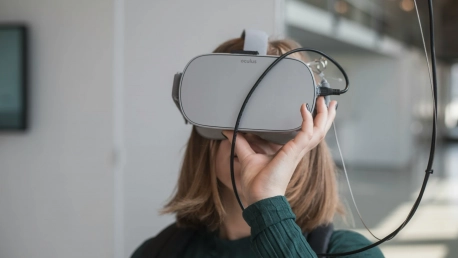Virtual reality (VR) technology, once confined to the realms of entertainment and education, is rapidly transforming the healthcare sector by offering novel solutions for medical training, physical therapy, and mental health treatments. By simulating immersive, three-dimensional environments, VR provides valuable experiences that closely resemble real-world scenarios, enhancing the ability of healthcare professionals to deliver high-quality patient care. However, as its application broadens, so too do the legal considerations surrounding its use. This article explores the multifaceted impact of VR in healthcare, the myriad benefits it brings, and the emerging legal implications that may soon shape the industry.
The Role of VR in Medical Training and Education
The integration of VR into medical training is revolutionizing how healthcare professionals learn and perfect their skills. VR platforms provide immersive and hands-on training that has been shown to enhance surgical performance significantly. A study from the University of California highlighted a remarkable 230% improvement in surgeons’ overall performance when trained using VR compared to conventional methods. These findings underscore VR’s potential to provide training solutions that are not only cost-effective but also time-efficient, reducing the logistical challenges typically associated with traditional learning methods involving cadavers and live patients.Educational institutions like Imperial College London and the University of East Anglia have been at the forefront of incorporating VR into their curricula, aiming to simulate emergency medical situations and clinical examinations. At Imperial College, trainees are presented with multiple-choice scenarios during VR simulations of critical situations like cardiac arrests and asthma attacks, which thoroughly prepare them for real-life medical practices. Similarly, the University of East Anglia has implemented the use of VR headsets for students, enabling them to immerse themselves in learning experiences related to anatomy, emergency medicine, and clinical examinations. By integrating VR technology, students gain practical knowledge in an engaging format without the logistical complexities of traditional training methods.VR’s capacity to foster empathy among healthcare professionals also stands out as a significant benefit. By simulating conditions such as macular degeneration and high-frequency hearing loss, VR provides medical students and professionals a firsthand experience of patients’ struggles, which can improve the quality of patient care and communication. These immersive experiences help prepare medical students and practicing healthcare professionals alike for the multifaceted challenges they may encounter in their careers, illustrating the expansive potential of VR in medical education.
VR in Physical Therapy: Revolutionizing Rehabilitation
Physical therapy is another area where VR is making significant strides, offering innovative rehabilitation solutions. The technology creates interactive environments that not only engage patients but also contribute significantly to their recovery. Studies suggest that VR therapy can notably improve motor function in children with cerebral palsy by providing engaging and adaptable exercises seamlessly integrated into the rehabilitation process. This form of therapy is particularly effective because it empowers patients by making the exercises enjoyable, fostering a highly motivating and interactive atmosphere conducive to better rehabilitation outcomes.Researchers in regions such as Sheffield and Leeds have been pioneering new VR applications aimed at treating specific medical conditions. For example, they are developing a VR platform designed to enhance the physiotherapy of children with Duchenne muscular dystrophy, a disease characterized by the progressive degeneration of muscles. This targeted approach demonstrates VR’s capacity to offer customized therapeutic interventions that address the unique medical needs of individual patients.VR therapy’s engaging nature ensures that patients maintain motivation throughout their rehabilitation, which can lead to more positive outcomes. By simulating real-world scenarios within a controlled environment, VR aids patients in regaining mobility, strengthening muscles, and improving coordination. These benefits illustrate VR’s transformative potential in the realm of physical therapy, positioning it as a powerful tool for modern rehabilitation techniques.
Mental Health Treatments: VR as a Therapeutic Tool
VR’s impact extends to the mental health realm, where it serves as an effective and transformative tool for psychological therapy. Research involving nine NHS Trusts revealed that VR could be an effective treatment for patients diagnosed with psychosis, particularly benefiting those with severe psychological challenges such as agoraphobia. VR’s unique ability to create controlled, immersive experiences makes it a valuable treatment option for various mental health conditions, offering a promising new avenue for therapeutic interventions.In Northern England, VR therapy is utilized specifically for young people diagnosed with Autism Spectrum Disorder (ASD) to help them manage particular anxieties and phobias. By confronting fears within a safe virtual setting, these individuals can gradually overcome their anxieties, leading to a significantly improved quality of life. This targeted use of VR demonstrates its versatility and effectiveness as a mental health treatment tool, providing unique solutions for individual patient needs.Beyond condition-specific treatments, VR also offers relaxation experiences that promote general well-being. Applications incorporating guided meditations, breathing exercises, and serene virtual landscapes can significantly reduce stress and enhance mental health for a broader audience. These immersive experiences provide users with accessible and effective mental health support, making VR a versatile tool in both clinical and everyday settings.
Legal Implications of VR in Healthcare
Virtual reality (VR) technology, originally limited to fields such as entertainment and education, is now making significant strides in the healthcare sector by providing innovative solutions for medical training, physical rehabilitation, and mental health therapies. By creating immersive, three-dimensional simulations, VR enables healthcare professionals to gain hands-on experience in lifelike scenarios, thus boosting their capability to offer superior patient care. The scope of VR’s applications is continually expanding, but this growth brings new legal challenges and considerations. As VR continues to be integrated into more healthcare practices, the balance between innovation and regulation will be crucial to its success and safe adoption in medical environments.









